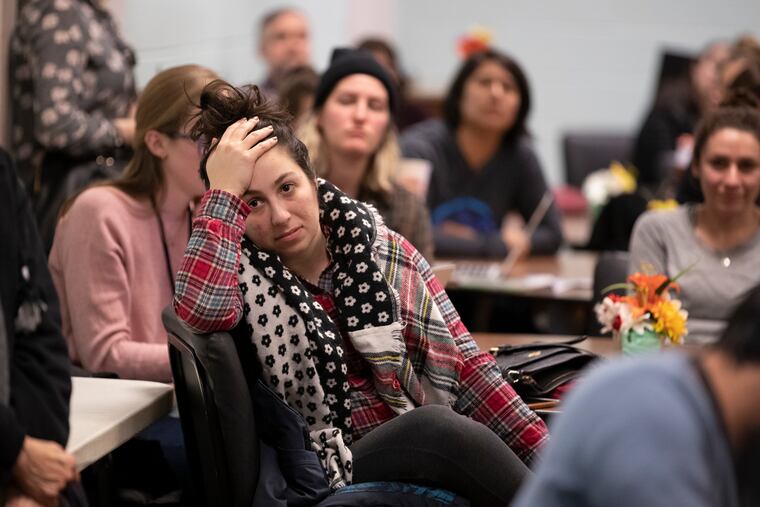6 weeks after rowhouse explosion, South Philly residents still feel that they aren’t getting answers
“These people that were here are not the people doing the work,” said resident Manny Rivera. “They were just here to paint a pretty picture.”

For the first time since a gas-fed explosion killed two people in South Philadelphia, city officials gathered with residents of the block to provide information and updates on the construction and replacement of street infrastructure.
Nearly 20 officials from City Council, the Philadelphia Gas Works, the Streets and Water Departments, and related agencies tried to explain a months-long timeline for filling sinkholes and replacing gas and water mains. But they were hammered with questions from a skeptical crowd of more than 100 residents at the Older Adults Center on East Passyunk Avenue, who have criticized what they see as the city’s lack of transparency.
“I’m sorry, but I would say bull...,” resident Francis Hoeber said to representatives from the Streets Department. “You are not informed about what is going on in your department and on your street.”
“You have a public safety problem here and you’re not making your due diligence,” added another resident. “I am concerned that all of you up there working for the city cannot get your act together to work together.”
The meeting was a follow-up a Jan. 16 announcement in which officials said a crack in a 92-year-old gas main led to the explosion and fire on Dec. 19, 2019, then offered little other information about the blast on the 1400 block of South Eighth Street that collapsed five rowhouses and killed two people. Officials then only had an approximate schedule for when the block and the surrounding streets that were affected would be repaired.
» READ MORE: He wore a Phillies cap and V-necks. The South Philly explosion destroyed all physical mementos of him.
Since then, residents say, they have been putting up with frequent interruptions in water service, gas leaks and the smell of gas in their homes, and closed streets.
On Wednesday, the schedule for repairs was still loose. After officials from eight departments gave reports, the conclusion was that PGW would begin replacing the gas main on Eighth in February, with a goal of finishing by March. After that, the Water Department would replace the main, and once that work is done, streets would be repaired.
The Pennsylvania Public Utility Commission is still investigating the underlying cause of the gas main’s failure.
At the earlier announcement, officials including Councilmember Mark Squilla, who also attended Wednesday’s meeting, apologized to residents, vowed to be more transparent, and assigned a point person for residents to contact.
On Wednesday, pamphlets for services for people struggling with post-traumatic stress and depression lined the entryway table, and Spanish and Chinese translators were available.
“I want you to know personally that what is happening on your street is a top priority to Philadelphia Water and to me,” said Water Commissioner Randy Hayman.
Residents said they appreciated the meeting, but many still believed that their questions about issues leading up to the explosion and ongoing street problems weren’t answered.
“These people that were here are not the people doing the work,” said Manny Rivera of Wilder Street. “They were just here to paint a pretty picture.”
Rivera asked the Streets Department why cracks continue to grow in the streets, a question also posed at the Jan. 16 meeting. Deputy Streets Commissioner Richard Montanez said he wasn’t sure. Montanez said he would bring a crew to the site on Friday to evaluate.
“When the questions came, they didn’t have answers,” Rivera said.